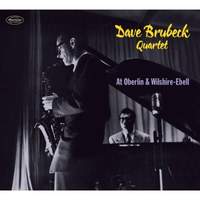Recording of the Week,
Dave Brubeck Quartet at Oberlin & Wilshire-Ebell
 Several of the earliest Dave Brubeck Quartet recordings stem from the ‘Jazz Goes to College’ concerts that they helped pioneer in the early fifties. By taking jazz out to America’s academic centres the group helped introduce the music to a young, middle-class and predominantly white audience who would, in turn, reward them by buying millions of records over the coming decades. A thrilling example of the energy that they brought to these engagements can be heard in the concert at Oberlin College, Ohio, recorded on 2nd March 1953, and generously coupled on this new compilation with an appearance at the Wilshire Ebell Theatre in Los Angeles, shortly after on 20th June. Brubeck was already becoming a major figure at this point, only a year before he would be featured on the cover of Time Magazine (but still three years before the arrival of drummer Joe Morello and bassist Eugene Wright completed the classic line-up). Historically important as snapshots of Brubeck and altoist Paul Desmond playfully experimenting with their unique style, they stand as thrilling and progressive jazz recordings in their own right.
Several of the earliest Dave Brubeck Quartet recordings stem from the ‘Jazz Goes to College’ concerts that they helped pioneer in the early fifties. By taking jazz out to America’s academic centres the group helped introduce the music to a young, middle-class and predominantly white audience who would, in turn, reward them by buying millions of records over the coming decades. A thrilling example of the energy that they brought to these engagements can be heard in the concert at Oberlin College, Ohio, recorded on 2nd March 1953, and generously coupled on this new compilation with an appearance at the Wilshire Ebell Theatre in Los Angeles, shortly after on 20th June. Brubeck was already becoming a major figure at this point, only a year before he would be featured on the cover of Time Magazine (but still three years before the arrival of drummer Joe Morello and bassist Eugene Wright completed the classic line-up). Historically important as snapshots of Brubeck and altoist Paul Desmond playfully experimenting with their unique style, they stand as thrilling and progressive jazz recordings in their own right.
Having met on military service in 1944, Brubeck invited Desmond to join his newly formed quartet in 1951, with the group cutting their teeth during a long residency at the Black Hawk Club in San Francisco. The rhythm section in the early years normally featured bassist Bob Bates and drummer Joe Dodge, but for both of these 1953 concerts we find Lloyd Davis (drums) and Ron Crotty (bass) sitting in. Both provide often driving, propulsive support for the two soloists, allowing their imagination to truly take off with a selection of standards such as Stardust and Let’s Fall in Love. Brubeck had suffered neck and spinal injuries whilst diving in Hawaii in 1951, the long-term repercussions of which necessitated changes in his playing style. Whilst his bebop peers were playing fast single-note runs, Brubeck started playing harmonically complex block chords, with a pinch of Thelonious Monk’s rhythmic unpredictability. Brubeck’s mannerisms drew criticism from some quarters, claiming he couldn’t properly swing, but ultimately it was the contrast between Brubeck’s often jerky playing and Desmond’s languid alto that made the quartet sound so fresh, as can be heard on Perdido from the Oberlin concert. As would become a familiar template, Desmond takes the first solo, delighting with nimble rhythmic figures (and a few acrobatic leaps that pre-empt some of Eric Dolphy’s tricks later in the decade), to be followed by Brubeck joyfully hammering out chords, building intensity until the wave breaks and Desmond, Davis and Crotty clear the air.
The Way You Look Tonight features an exceptional, unbroken stream of consciousness solo by Desmond, turning the theme inside out multiple times, exhibiting his knack for playing both hot and cool simultaneously. By way of contrast, Brubeck’s solo delights in tripping over itself, being deliberately clunky and incongruous at points, making the resolution that much more of a rush of energy. This generous set has universal appeal, either for those already familiar with the classic quartet recordings or as an infectious entry point for newcomers.



